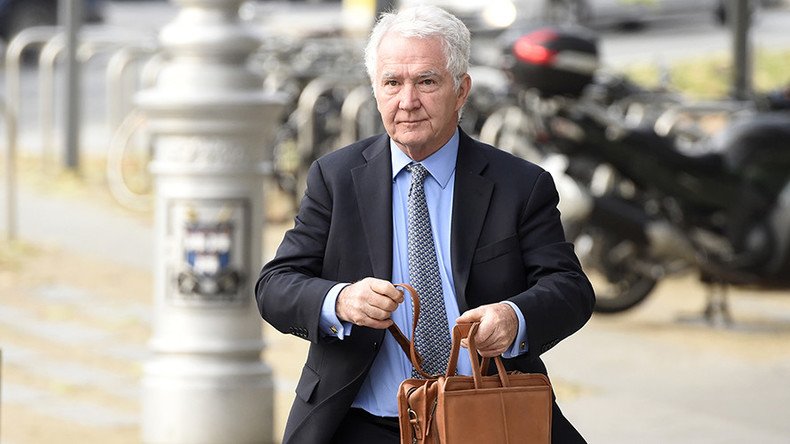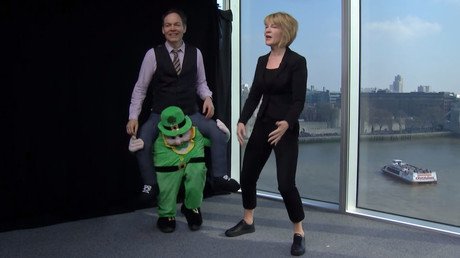'Financial terrorist': Former bank boss acquitted of all charges despite blowing up Irish economy

Former Anglo Irish Bank Chairman Sean Fitzpatrick, famously described by RT’s Max Keiser as a “financial terrorist,” is in the clear after being acquitted of all charges in a long-running multi-million euro loans case.
For almost 20 years Fitzpatrick served as chief executive of the now-defunct Anglo Irish Bank – the third largest in Ireland and a major lender to the construction and property sectors, the collapse of which caused the Irish economy to implode.
Chairman of Anglo from 2005 until 2008, Fitzgerald was a key player during the 'Celtic Tiger' era when excess and greed became the dream for many. It’s estimated the subsequent government bailout will eventually cost the Irish taxpayer between €34 billion and €40 billion.
On Tuesday Judge John Aylmer at Dublin Circuit Court in Ireland acquitted Fitzpatrick of 27 charges of misleading the bank's auditors and furnishing false information about multi-million euro loans to him and to people connected to him between 2002 and 2007.
The judge strongly criticized the investigation by the Office of the Director of Corporate Enforcement (ODCE) in his ruling, the Irish Times reports.
Aylmer said the ODCE fell short of the “impartial, unbiased investigation that an accused is entitled to,” he was cited as saying by RTE. He added that key witnesses had been coached and the ODCE had failed to seek out evidence of innocence as well as guilt.
He accused the office, which has the mandate to investigate allegations of breaches of company law, of making assumptions about Fitzpatrick.
The judge also expressed concern that material shredded by the ODCE's chief investigator during Mr Fitzpatrick's first trial may have been material that could have assisted the defense.
During the trial the prosecution argued that multi-million euro loans taken out by Fitzpatrick and his family were “artificially reduced” by short term loans from other sources for a period of two weeks around the bank’s financial end-of-year statement.
The prosecution alleged that he failed to disclose the extent of these loans to the bank’s auditors in the years 2002 to 2007. FitzPatrick denied all charges.
In 2014, he was found not guilty of 10 counts of providing unlawful financial assistance to a group of investors dubbed the ‘Maple 10’ to buy shares in the bank in July 2008.
Judge Aylmer’s decision was made on the 126th day of the trial – making it the longest criminal trial in the history of the Irish state. The jury is due to return to court tomorrow morning but will be directed by the judge to acquit Fitzpatrick.
Speaking outside court, Fitzpatrick told RTE “it was a long and tiring and difficult time” for him and his family. He thanked his legal team and expressed appreciation to the “media’s restraint in this current trial.”
Former Anglo Irish Bank chairman Sean FitzPatrick thanked his legal team and said "it's a wonderful day for me and my family" pic.twitter.com/lBrAG3Q3N5
— RTÉ News (@rtenews) May 23, 2017
In 2008 the Irish state issued a blanket €440 billion guarantee of all liabilities in the crippled banking system. Fitzpatrick refused to apologize to the Irish taxpayer who was forced to foot the bailout bill, blaming the global recession for the circumstances. Anglo Irish was nationalized in 2009.
Max Keiser, host of the ‘Keiser Report,’ previously dubbed Fitzpatrick along with other key figures in the Irish banking collapse “financial terrorists.”
“The people in Ireland are getting hammered by these financial terrorists,” he said.
“We have to expand the Patriot Act, and other financial statutes around the world, to cover financial terrorism.
“To cover Seán Fitzpatrick, because clearly he qualifies. Ireland should recognise that they’ve been victimised by a terrorist attack, and need to respond accordingly,” he told The Journal ahead of a visit to Ireland in 2011.
Jonathan Sugarman, the former Unicredit bank executive who reported liquidity breaches during his first few weeks at Unicredit Ireland, has led criticism of the court decision Tuesday. Sugarman says he repeatedly warned the Financial Regulator that the Irish banking system was facing a liquidity crisis before the financial crash.
Ex- #Anglo chair Sean FitzPatrick acquitted of all charges on day 126 of trial
— Jonathan Sugarman (@WhistleIRL) May 23, 2017
ONLY in #Ireland!#JonathanSugarmanhttps://t.co/via0x8irJz
Justice in #Ireland?!? FitzPatrick, CEO of collapsd #Anglo bank, acquitted of ALL 126 charges against him. Well done #DPP#JonathanSugarmanpic.twitter.com/yfQJePXhHJ
— Jonathan Sugarman (@WhistleIRL) May 23, 2017
Sean Fitzpatrick acquitted of all charges on direction of judge. #JobstownNotGuilty defendants are in week 5 of 'false imprisonment' trial.
— Paul Murphy (@paulmurphy_TD) May 23, 2017
Sean Fitzpatrick helped bankrupt a nation gets acquitted - Paul Begley changes labels from Garlic to Apples 6 years. #seanfitzpatrick#vinb
— Ben Redline (@BenjaminZZR) May 23, 2017













